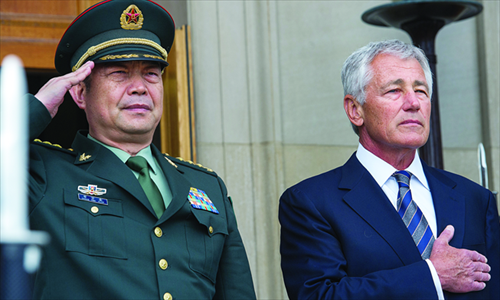China, US defense chiefs announce series of joint drills

Chinese Minister of National Defense Chang Wanquan (left) and US Secretary of Defense Chuck Hagel listen to their respective national anthems during an arrival ceremony for Chang at the Pentagon in Washington, DC on Monday. Photo: AFP
China's defense chief Chang Wanquan said China is determined to defend its territory, sovereignty and maritime rights during his visit to the Pentagon, where he and his US counterpart vowed to expand cooperation and exchanges between the two militaries.
Following more than three hours of talks at the Pentagon on Monday, Chang and US Defense Secretary Chuck Hagel announced a series of upcoming joint exercises and defense exchanges.
According to the two officials, the two navies will conduct their second counter-piracy exercise in the Gulf of Aden this weekend, and the first China-US humanitarian assistance and disaster relief exercise with active forces will be held in Hawaii this November.
Chang and Hagel both confirmed China's first-ever participation in the Rim of the Pacific multilateral naval exercise next year.
US Army Chief of Staff Raymond Odierno and Air Force Chief of Staff Mark Welsh will visit China this year, and Wu Shengli, the commander of the Chinese Navy, will travel to the US, Hagel said.
He added that Martin Dempsey, chairman of the US Joint Chiefs of Staff, also offered to host a visit from his Chinese counterpart, Fang Fenghui, next year.
Chang said the two sides agreed to "actively explore a notification mechanism for major military activities and continue to study the rules of behavior on military air and maritime activities."
Shi Yinhong, director of the Center on American Studies at the Renmin University of China, told the Global Times that he believes the current defense exchanges between China and the US are at the best level they have been at for the past decade. "There is more room to elevate the level of exchanges, as more Sino-US military exchange activities are awaiting," he said.
Despite the two sides' vow to improve strategic trust through cooperation, the two countries are still divided over a wide range of issues.
The Chinese defense chief said China always insists that related disputes be solved through dialogue and negotiation. "However, no one should be under the illusion that China would barter away our core interests. And no one should underestimate our will and determination in defending our territory, sovereignty, and maritime rights," he said.
Shi interpreted Chang's remarks as a warning to the US to be cautious in any attempt to contain China.
Chang further expressed his concern about the US emphasis on the military aspect of the comprehensive policy of the Asia pivot, accusing the intensified US-led military exercises of "further complicating the situation in the region."
The general cautioned that the US pivot to Asia should not target a specific country in the region.
For his part, Hagel said that Washington remained neutral over sovereignty issues but insisted that disagreements be resolved peacefully, "without coercion."
Xin Qiang, a deputy director of the Center for American Studies at Fudan University, told the Global Times that China would judge the US' strategic intent via its deeds instead of its words, and "it is hard for the US to win China's trust with its present practice."
Xin noted that the US practice has in fact sent signals to countries that have territorial disputes with China, stirring them to confront China against the backdrop of US rebalancing. "China hopes the US will stop sending out these false signals," he said.
Separately, a fleet of the Chinese Navy, consisting of the missile destroyer Qingdao, missile frigate Linyi and supply ship Hongzehu, on Tuesday set off from a military port in Qingdao city, East China's Shandong Province, to visit the US, Australia and New Zealand.
Agencies contributed to this story